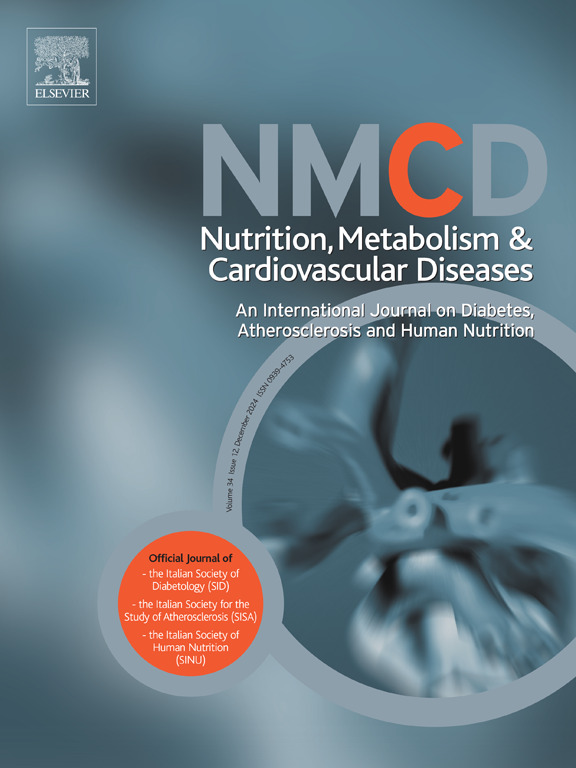A systematic review of dietary assessment methods used for South Asian migrants in high-income host countries
IF 3.3
3区 医学
Q2 CARDIAC & CARDIOVASCULAR SYSTEMS
Nutrition Metabolism and Cardiovascular Diseases
Pub Date : 2025-03-01
DOI:10.1016/j.numecd.2024.103795
引用次数: 0
Abstract
Aim
The increased risk of chronic diseases and migration to high-income countries in South Asians has been well established. Considering exposure to changing dietary intake and lifestyle upon migration, accurate nutrition assessment is crucial in this population. The present review aims to summarise dietary assessment methods and nutrient databases for South Asian (SA) migrants in high-income countries.
Data Synthesis
A systematic search of Medline, Web of Sciences, Embase, CINHAL and Cochrane Central Library databases was conducted in August 2023. Eligible studies were critically appraised using Joanna Briggs Institute Critical Appraisal Tools. Data was extracted using a purpose-built spreadsheet. This systematic review has been registered with PROSPERO (Reg ID: CRD42021274929).
Conclusions
A total of 12991 studies were identified, of which 46 met the eligibility criteria. Dietary assessment methods were categorised as newly validated, previously validated, and not validated. Only ten studies used a validated culturally appropriate dietary assessment tool. This review shows that FFQ and 24-hour (24hr) dietary recall are the most utilised dietary assessment tools for SA migrants. The findings highlight the limited culturally appropriate dietary assessment tools available for SA migrants. Specific design and validation issues, such as cultural specificity, were identified that researchers should consider when developing new nutritional assessment tools for SA migrants.
对高收入东道国南亚移民膳食评估方法的系统回顾
目的:南亚人患慢性病和向高收入国家移民的风险增加已得到充分证实。考虑到移民过程中饮食摄入和生活方式的改变,对这一人群进行准确的营养评估至关重要。本综述旨在总结高收入国家南亚(SA)移民的饮食评估方法和营养数据库。数据综合:于2023年8月系统检索Medline、Web of Sciences、Embase、CINHAL和Cochrane Central Library数据库。使用乔安娜布里格斯研究所批判性评估工具对符合条件的研究进行批判性评估。数据是用专门制作的电子表格提取的。本系统评价已在PROSPERO注册(注册编号:CRD42021274929)。结论:共纳入12991项研究,其中46项符合入选标准。饮食评估方法分为新验证、先前验证和未验证。只有10项研究使用了经过验证的适合文化的饮食评估工具。这篇综述表明,FFQ和24小时(24小时)饮食回忆是南澳移民最常用的饮食评估工具。研究结果强调了适用于南澳移民的饮食评估工具在文化上的局限性。具体的设计和验证问题,如文化特异性,被确定为研究人员在开发新的SA移民营养评估工具时应该考虑的问题。
本文章由计算机程序翻译,如有差异,请以英文原文为准。
求助全文
约1分钟内获得全文
求助全文
来源期刊
CiteScore
6.80
自引率
2.60%
发文量
332
审稿时长
57 days
期刊介绍:
Nutrition, Metabolism & Cardiovascular Diseases is a forum designed to focus on the powerful interplay between nutritional and metabolic alterations, and cardiovascular disorders. It aims to be a highly qualified tool to help refine strategies against the nutrition-related epidemics of metabolic and cardiovascular diseases. By presenting original clinical and experimental findings, it introduces readers and authors into a rapidly developing area of clinical and preventive medicine, including also vascular biology. Of particular concern are the origins, the mechanisms and the means to prevent and control diabetes, atherosclerosis, hypertension, and other nutrition-related diseases.

 求助内容:
求助内容: 应助结果提醒方式:
应助结果提醒方式:


